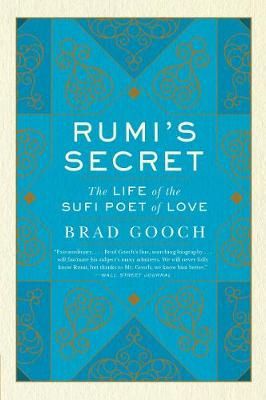Buy or gift a stand-alone digital subscription and get unlimited access to dozens of back issues for just £18.99 / $18.99 a year.
Please register at www.exacteditions.com/digital/cornucopia with your subscriber account number or contact subscriptions@cornucopia.net
Buy a digital subscription Go to the Digital Edition
The Life of the Sufi Poet of Love
Review by Erik Hage, Harvard Review, April 2017
Many would find it surprising that a thirteenth-century Sufi mystic is one of the best-selling poets in the world. In fact, in 2014, the BBC declared the Persian poet Rumi to be the best-selling poet in the United States, with his ecstatic verses of love, loss, and enlightenment clearly finding a universal audience.
Jalal ad-Din Muhammad Rumi himself cuts a fascinating but mysterious figure across the centuries, beckoning readers with such stark yet illuminative lines as “I have beheaded anger with the sword of patience,” and “Words of praise taste delicious, / But be careful, they are filled with fire.” Rumi’s appeal lies in his ability to offer inspirational wisdom couched in relatable imagery and everyday language, moving with ease across Eastern and Western ways of thinking with common sense and ancient allure.
But one of the least penetrable mysteries of Rumi has been his biography. Who embodied these enchanting and enduring bursts of wisdom? Acclaimed biographer Brad Gooch, whose books about Flannery O’Connor and Frank O’Hara represent high-water marks in literary biography, set out to establish just that, not merely by burying himself in texts but by traveling the 2,500 miles that contained Rumi’s life. Gooch chased traces of Runi along the old Silk Road in Iran, on Mount Qasiyun near Damascus, in Uzbekistan, and in Konya, Turkey, where the poet spent the bulk of his existence. Gooch also spent months in intensive Persian language programs; the translations in Rumi’s Secret: The Life of the Sufi Poet of Love are the writer’s own, in collaboration with Iranian-American writer Maryam Mortaz.
The result of this utter immersion is a wondrous, groundbreaking book that details Rumi’s development from his early days of entitlement as a worshipped scholar and preacher of the “turbaned class” to an eventual disavowal of his fame—and a life of humility and “speaking from the heart,” rather than in the “formal double-talk” of the educated elite. The catalyst of this transformation was his intimate friendship with Shams of Tabriz, a wandering outsider and contrarian whose own enlightenment had been achieved through nomadism, odd jobs, and defiance. Upon meeting, Rumi (in his thirties) and Shams (in his sixties) fell into an intense and loving disciple-master bond.
With deft insight and enviable clarity, Gooch brings us close to this sequestered and transformative relationship. The reader comes to understand how Shams’s influence instilled in the younger man a tendency for “familiar and homey” analogies that betrayed his high-minded learning and helped him find his natural voice. As Gooch writes, Shams’s teachings became the “raw material of Rumi’s poetry”:
[H]e gave him perhaps his most central metaphor … comparing the evolution of the human spirit, through the workings of separation, to cooking. This imagery—a way of explaining how painful separation can have beneficial results, and how love, both human and divine, involves both union and separation—became a continuous motif in Rumi’s poetry and talks. … Rumi liked to tell of the chickpea transformed through suffering in the boiling water of the cook’s pot.
As Rumi wrote of his own pain at the loss of Shams: “My entire life has come down to three words— / I was raw, I was cooked, I was burned.”
This loss of a mentor, friend, and possibly lover became another transformative experience, as Shams’s mysterious disappearance after two and a half years of intimacy became his final gift and lesson. In agonizing grief, Rumi was set into full motion as a poet, his howls of grief turning to a spinning dance, as he “tried to re-create his closeness to Shams once again in sama … this mystical dance they had performed together as a form of bonding, though now he was revolving incoherently around the absence of Shams as much as practicing enlightenment.” And while Rumi would form other bonds, the departed Shams and this meditative whirling became his energy source and muse.
Never have we known Rumi this intimately or understood the life behind the verse so well. Brad Gooch moves elegantly between storytelling, the psychologies of relationships, and evocative criticism as he brings the Western reader into ancient Arab, Persian, and Turkic worlds. His graceful prose is charged with luminous details: the sounds, the sights, the very feel of these worlds, and how they generated Rumi’s ecstatic yet practical verse. With Rumi’s Secret, Gooch has not only set another high-water mark in literary biography, he has given the fullness of Rumi to us at a moment when we need him more than ever. For, as Rumi put it, “When you light your lamp, you are not one, you are thousands.”
1. STANDARD
Standard, untracked shipping is available worldwide. However, for high-value or heavy shipments outside the UK and Turkey, we strongly recommend option 2 or 3.
2. TRACKED SHIPPING
You can choose this option when ordering online.
3. EXPRESS SHIPPING
Contact subscriptions@cornucopia.net for a quote.
You can also order directly through subscriptions@cornucopia.net if you are worried about shipping times. We can issue a secure online invoice payable by debit or credit card for your order.

Cornucopia works in partnership with the digital publishing platform Exact Editions to offer individual and institutional subscribers unlimited access to a searchable archive of fascinating back issues and every newly published issue. The digital edition of Cornucopia is available cross-platform on web, iOS and Android and offers a comprehensive search function, allowing the title’s cultural content to be delved into at the touch of a button.
Digital Subscription: £18.99 / $18.99 (1 year)
Subscribe now